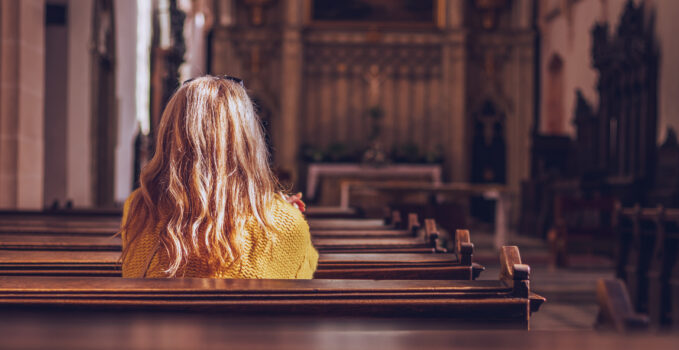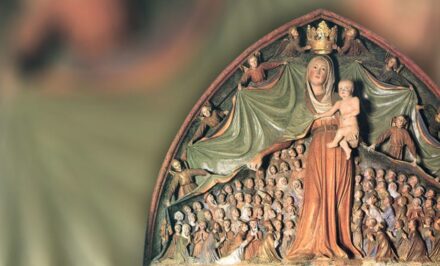M. B. Oelschner, Germany •
I want everything / I do not want to be a spectator / I want to do something myself / And always know why / I will not give in / I want everything. This old song by Gitte (album: Ungeschminkt, 1982) comes to mind as I reflect on the voting results of the German “Synodal Way” on women’s priesthood issues: In their final document of the “Synodal Way,” about 81 percent – both lay and bishops – voted in favor of women’s priesthood, and about 79 percent voted in favor of women’s diaconate. —
That there will be no priesthood for women in the Roman Catholic Church in the near future is clear. Pope John Paul II left no doubt about this in his pronouncement. This door is obviously still closed for an indefinite time. Why shake at it desperately according to the motto “I want everything”?
Enough time for endless delays
But isn’t time running out for the local churches in Europe and Latin America? Is it really pastorally wise to focus on the priesthood for women when there is the possibility of “viri probati”, that is, priestly ordination for proven married men?
Unaffected by this is the law of the equality before God of man and woman: the pastoral theologian and longtime executive director of Misereor, Josef Sayer, refers to the often-quoted Epistle to the Galatians of the equality of all and says quite bluntly: “From this point of view, it seems to me downright ridiculous if women are not allowed to read the Gospel at Mass or if well-educated women are not allowed to preach.”
Discussions for over one hundred years
Of course, he is right, say most women – at least in German-speaking countries. That is because the question of the diaconate of women has been discussed for more than one hundred years, at least in Germany. For example, the “Association of Catholic Women Deacons” has existed since 1908. St. Edith Stein said laconically: “Dogmatically, there seems to me to be nothing in the way”.
The 2nd Vatican Council at least managed to establish the “Permanent Diaconate for Men”. But when it comes to the diaconate for women, it becomes difficult – and not only from the point of view of canon law! In the meantime, not only theologians but also interested laymen know that there have been women deacons since the beginning of the church. It becomes difficult when it comes to the question of the tasks in the past and thus also for the future. Apparently, Pope Francis wanted to put an end to the theological wrangling by setting up a Theological Commission on this question.
It met for the first time in 2016 – but to this day theological experts do not have certainty about whether the ordination of women as deacons “was an ordination with the same form and finality as that of men,” the pope said last year, adding that the commission had disagreed, especially with regard to the sacramentality of the ordination of deacons. At the same time, however, he encouraged – slightly impatiently – the commission to continue its work. However, dogmatics professor Margit Eckholt considers it decisive whether the diaconate of women has merely the form of a blessing or that of the sacrament of ordination.
Barbara Hallensleben, also a professor of dogmatics and appointed to the commission by Pope Francis, expresses herself very cautiously. Like other theologians, she points to the various historical sources, which are anything but clear, and prefers to speak of “diakonia.” This could be understood to mean all those who “place their lives at the service of the Church and can exercise a ministry of leadership, men and women, by virtue of a vocation recognized by the Church.”
The Pope opened the doors of the Church very wide with his letter “Querida Amazonia,” in which he proposed that important questions be discussed and also decided in the local Churches. So green light for the synodal way! This is true in this question and also for the South Americans who complained during the Amazon Synod that because of a lack of personnel, Christianity was virtually evaporating.

The missions of the Schoenstatt Movement in Argentina, Paraguay, Chile, and other Latin American countries reach priestless communities
The Holy Mass – an administration of scarcity
I had a brief personal insight a few years ago in Bolivia: Father Filippo had made it his mission to care for the very poorest. For him, this included the lepers who had been cast out by society and who lived hidden in small villages along the Rio Mamoré. His German guests had no objection to a “romantic” trip in an old houseboat in the direction of Guajamarin. When the boat anchored at a village on Saturday evening, children and women were quickly on hand. When Don Filippo then explained that he wanted to celebrate Holy Mass with the villagers on Sunday morning, the confusion was complete: great shaking of heads in the direction of “No, impossible”. Finally, one woman took heart and solved the mystery when she said, “It can’t be, we’ve already had one Mass this year!”
One Mass a year! I never forgot that, although Bishop Eugenio Coter, Apostolic Administrator of Pando, easily tops that statement. He speaks of parishes that have not had Mass in 18 years. Women catechists, often poorly trained, do what they can to maintain a kind of “basic Christianity.” Women deacons might not celebrate Mass, but they could serve the Eucharist and administer sacraments such as baptism, marriage and anointing of the sick. What a wide field also for us women from the Schoenstatt Movement….

Missions in the interior of Paraguay
Original: German, 12.02.2022. Translation: Maria Fischer @schoenstatt.org














